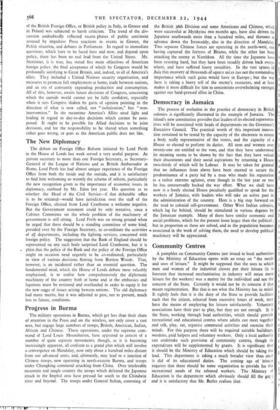The New Diplomacy
The debate on Foreign Office Reform initiated by Lord Perth in the House of Lords last week served a very useful purpose. As private secretary to more than one Foreign Secretary, as Secretary- General of the League of Nations and as British Ambassador at Rome, Lord Perth has had almost unique experience of the Foreign Office from both the inside and the outside, and it is satisfactory to find him welcoming so warmly the scheme of reform, particularly the new recognition given to the importance of economic issues in diplomacy, outlined by Mr. Eden last year. His question as to whether the Head of the Civil Service—if that debatable office is to be retained—would have jurisdiction over the staff of the Foreign Office, elicited from Lord Cranborne a welcome negative. But the Government statement could be only tentative, since a Cabinet Committee on the whole problem of the machinery of government is still sitting. Lord Perth was on strong ground when he urged that there should be a standing committee of some kind, presided over by the Foreign Secretary, to co-ordinate the activities of all departments, including the fighting services, concerned with foreign policy. The suggestion that the Bank of England should be represented on any such body 'surprised Lord Cranborne, but it is plain that the policy of the Bank and the policy of the Foreign Office might on occasion need urgently to be co-ordinated, particularly in view of various decisions flowing from Bretton Woods. That, however, is an incidental rather than an essential question. The fundamental need, which the House of Lords debate most valuably emphasised, is to realise how comprehensively the diplomatic machinery of the country both at home and at the embassies and legations must be reviewed and overhauled in order lo equip it for the new range of issues arising beween nations. The old diplomacy had many merits, but it was adjusted to past, not to present, much less to future, conditions.


























 Previous page
Previous page